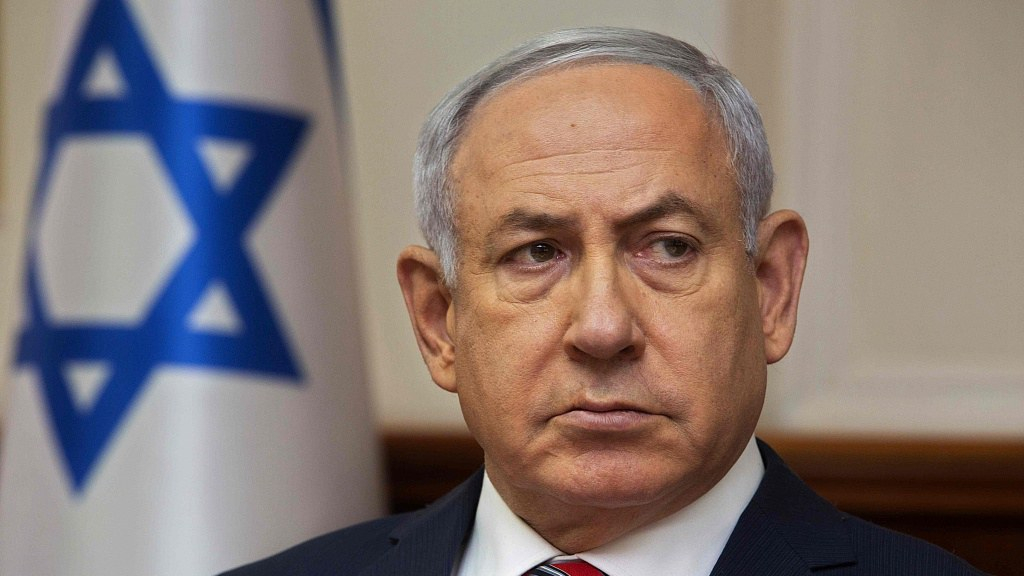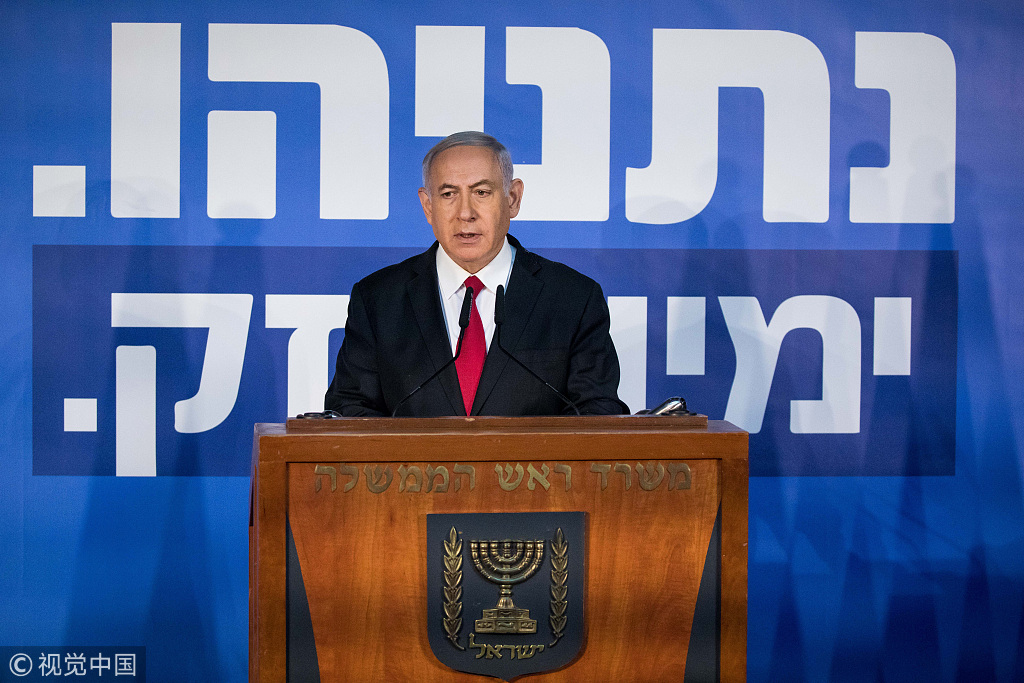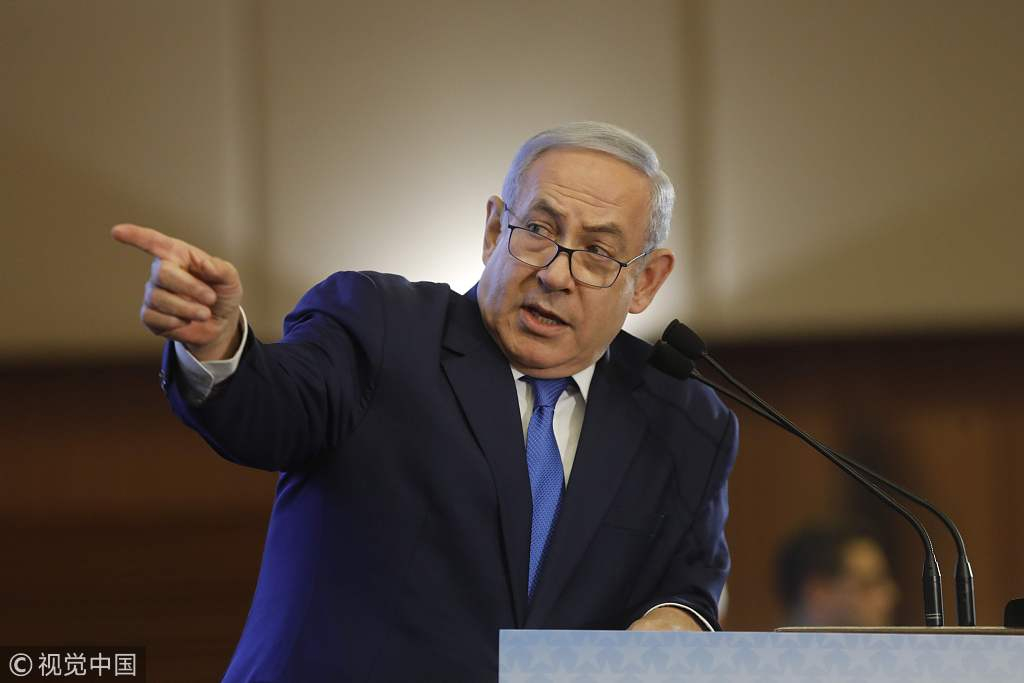
Opinion
17:57, 02-Mar-2019
Opinion: What has Netanyahu brought to Israel over the past decade?
Updated
18:55, 02-Mar-2019
Wang Jin

Editor's note: Wang Jin is a research fellow at the Charhar Institute. The article reflects the author's opinion and not necessarily the views of CGTN.
On February 28, Israel's attorney general decided to indict Prime Minister Benjamin Netanyahu on three criminals charges, making Netanyahu the first indicted incumbent prime minister in the country's history. Netanyahu now faces his most serious political challenge and may have to resign from the post.
In retrospect, what has Netanyahu brought to Israel over the past decade?
When Netanyahu was elected to his first term as prime minister in 1996, nobody expected him to become Israel's longest serving prime minister. Although he faced many challenges from inside his own Likud party and from other political groups, Netanyahu successfully held his post and defeated challengers in several national elections after 2009, when he began his second term. His lengthy time in office may be described as the "Netanyahu era."
As a state composed of different ethnic and religious groups, the internal frictions are very salient inside Israel. The mutual distrust between the Jewish majority and Palestinian minority groups is apparent, while the gulf between secular Jews and religious Jews is also unbridgeable.

Israeli Prime Minister Benjamin Netanyahu gives a statement to reporters in his office in Jerusalem, February 28, 2019. /VCG Photo
Israeli Prime Minister Benjamin Netanyahu gives a statement to reporters in his office in Jerusalem, February 28, 2019. /VCG Photo
The differences between various ethnic groups, such as the Europe-oriented Ashkenazi, the Latin-Jewish Sephardi, the Arab Mizrahi (or literally the "Eastern Jews"), African Jews and Russian Jews, are so salient that it is not easy to organize the distinct communities into a political system.
Even inside the religious groups, the ties between the orthodox groups, or Haredi groups, and the reformed Jewish groups are also strained. Different groups are divided by communities and the interactions are limited. In Israel, if you are young and energetic and hope to avoid religion, you would prefer to live in Tel Aviv; while if you are religious, you might be interested in living in Jerusalem.
Israel's internal social frictions are reflected in its parliament, or Knesset, elections. Political parties inside Israel are organized upon not only different or opposing political ideologies, such as the traditional left-wing Labor party and the right-wing Likud party, but also ethnic lines. There are 120 seats in the Knesset, and no single party has been able to win more than 60 seats in an election since modern Israel was established in 1948.
Different social, ethnic and ideological groups are usually interested in organizing their own political parties. For example, the Shas party, which stands for "Torah-Observant Sephardim," is a political group that represents the interests and concerns of Sephardic Jews.
Netanyahu started his political career in the 1980s and became a Knesset member in 1988. In 1996 he led the Likud party to win the Knesset election and started his post as prime minister. Although he was defeated in 1999 by the Ehud Barak-led Labor party and became marginalized by his own party in the early 2000s when Ariel Sharon held power, Netanyahu remained patient and regained the Likud leadership position in 2006 after Sharon suffered a stroke. In 2009, Netanyahu won the Knesset election and became prime minister – a position he has held ever since.

Israeli Prime Minister Benjamin Netanyahu speaks during a meeting of the Conference of Presidents of Major American Jewish Organizations, in Jerusalem, February 18, 2019. /VCG Photo
Israeli Prime Minister Benjamin Netanyahu speaks during a meeting of the Conference of Presidents of Major American Jewish Organizations, in Jerusalem, February 18, 2019. /VCG Photo
The key to Netanyahu's success in the political arena could be attributed to his image of safeguarding Israel's security. As the leader of the right-wing Likud party, Netanyahu expresses different or even paradoxical attitudes on different occasions. He always stresses different external threats, ranging from Hamas in the Gaza Strip to Iran, Hezbollah from Lebanon and Tehran-backed Shia militant groups from Syria. Netanyahu stresses Israel's legitimate occupation over the Golan Heights but keeps restraint from launching all-out war against Hamas in Gaza and Hezbollah in Lebanon.
Netanyahu is committed to a two-state solution – the establishment of an independent Palestinian state – to the Israel-Palestine issue, while describing Jerusalem as Israel's capital and remaining unwilling to concede too much at the negotiating table with Palestinian representatives. During the Netanyahu era, Israel finished a wall system separating Palestinian communities in the West Bank and East Jerusalem from Jewish settlements in West Bank.
In recent years, Netanyahu has tried to unite Israel with Saudi Arabia-led Arab states to resist the influence of Iran in the Middle East, and became the first Israeli leader to visit Oman, an important Gulf Arab state. The presidency of Donald Trump provides Netanyahu a reliable and close friend in Washington, and Trump's announcement of recognizing Jerusalem as Israel's capital and decision to move the U.S. Embassy from Tel Aviv to Jerusalem increased Netanyahu's popularity at home.
However, the indictment against Netanyahu might force him to resign. Although Netanyahu still insists that he is innocent, the indictment still influences his political image among the public and might challenge his popularity in the upcoming Knesset election in early April. The indictment has not been finalized, but it may still spell the end for Netanyahu's run as Israeli prime minister.
(If you want to contribute and have specific expertise, please contact us opinions@cgtn.com.)

SITEMAP
Copyright © 2018 CGTN. Beijing ICP prepared NO.16065310-3
Copyright © 2018 CGTN. Beijing ICP prepared NO.16065310-3